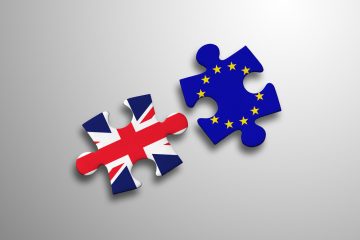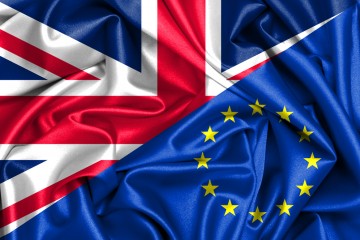
Estimating the Effect of Feature Selection in Computational Text Analysis
Below, I discuss and analyse pre-processing decisions in relation to an often-used application of text analysis: scaling. Here, I’ll be using a new tool, called preText (for R statistical software), to investigate the potential effect of different pre-processing options on our estimates. Replication material for this post may be found on my GitHub page. Feature Selection and Scaling Scaling algorithms rely on the bag-of-words (BoW) assumption, i.e. the idea that we can reduce text to individual words and sample them independently from a “bag” and still get some meaningful insights from the relative distribution of words across a corpus. For the demonstration below, I’ll be using the same selection of campaign speeches from one of my earlier blog posts, in which I used a …

Complex Negotiations are Dynamic and Unpredictable: An analysis of Sturgeon’s and May’s approach to Brexit
In the week of 13 March, two momentous events took place. Parliament passed the bill giving the government authority to notify the European Council that the United Kingdom intends to withdraw from the European Union. And First Minister Nicola Sturgeon announced that her government will introduce legislation for a second independence referendum for Scotland. The first occurred despite the House of Lords’ insistence on a prior guarantee of the status of EU citizens or of an up-or-down vote on the final deal (or no deal); the second was a surprise move, seemingly calculated to pre-empt a positive news cycle on the day the bill was approved. These two leaders’ approaches to Brexit so far show the difference between imposing order and control in an …

In a democracy, no decision should ever be irreversible
The British parliamentary system, inspired by John Locke, Edmund Burke, John Stuart Mill and many others who believed in a system of checks and balances to guarantee our liberties, has in the past been much admired as a model of liberal democracy, one that has enabled the peaceful evolution that has been an almost unique part of our history. Today it has been superseded. The doctrine of Jean-Jacques Rousseau, that the will of the people must always prevail, much admired by autocrats ever since the days of Robespierre and the Committee of Public Safety, now prevails in Westminster instead. Speaker after speaker in the House of Commons debates on Article 50 declared that, although he or she voted Remain and …

“It’s the economy stupid”: Declining labour mobility explains Trump’s victory
Donald Trump’s success in the US elections came as a surprise to both pollsters and political pundits. And since November, both have peddled numerous theories to explain their mistakes. Yet, one aspect of his electoral victory remains underappreciated: labour mobility. Labour mobility across regions is much higher in the United States compared to many other countries in the world, including the European Union members, allocating individuals into the jobs where they are the most productive. As such, mobility is an important factor for upward social mobility for middle class Americans, where they can increase their earnings and their life standards by moving to higher-earning jobs in dynamic regions. [1] But economic mobility has been declining over the last two decades.[2] …

The will of the people: A primer in direct democracy
of the United Kingdom of Great Britain and Northern Ireland, having been given sovereignty over whether the Kingdom leaves or remains in the European Union insist, in the interest of democracy and unity, on being given the opportunity to take an informed decision on the final outcome of the Art. 50 negotiations, as approved by parliament, through a referendum to either accept this outcome or to remain in the European Union. THE REFERENDUM PREDICAMENT A lot has been made in the press and in the recent parliamentary debates about the moral obligation for members of parliament to respect “the will of the people” as expressed in the narrow victory for leaving the European Union in the Brexit referendum of last …

THE NEW “NEW RIGHT” – TRUMP’S POLITICAL EARTHQUAKE
Four decades ago the concurrent Thatcher and Reagan governments heralded the arrival of the “New Right” political agenda, which prioritised market forces over the primacy of “the state” in their respective countries. New Right policies followed in the 1980s, including reducing income and corporate taxes, deregulating labour and financial markets, and the promotion of market mechanisms of consumer choice into public sector services such as health and schools. “Market over state” was the mantra of the New Right but as many commentators noted, making markets requires state action (not least in public order maintenance), resulting in a redeployment of state power rather than its diminishment. Having seized power through the electoral college used to elect the President of the United …

Americans Love Their General
In wake of the US Inauguration , we can look to a valuable insight provided by the great English liberal John Stuart Mill more than a century ago: everyone loves executive power—when his or her party wins the election. Representative government started to gain traction and popularity in the Western world after the democratic Revolutions of 1848. John Stuart Mill—a pioneer of Classical Liberalism—was one of its strongest advocates. Yet in Considerations on Representative Government, published in 1861, he also warned against a problem that could arise from such political arrangements. Specifically, the danger that people could begin to value their party holding power over freedom itself. ‘Members of parties are willing to abdicate his personal freedom of action into …

Brexit arithmetics: A logical approach to predicting a Brexit deal
Do we know more now about the likely shape of the future Brexit deal? While Theresa May’s speech has provided some much-needed clarity on the British position, her uncompromising stance on the single market could make the deal yet more unpredictable. In the configuration sketched out today, the eventual result will depend even less on what Theresa May wants and even more on what the rest of the EU will give her. Commentators tend to argue that there are too many unknowns to figure out the positions and bottom lines of the 27. But nevertheless, the fundamentals are arguably simple enough to be described in three short equations, each of which gives us a clue about an eventual Deal UK (Duk). Equation 1: …









